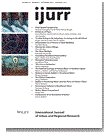Urban and suburban politics are increasingly intertwined in regions that aspire to be global. Powerful actors in the Chicago and Toronto regions have mobilized regional space to brand rescaled images of the urban experience, but questions remain as to who constructs and who can access the benefits of these revised spatial identities. Local political interests have tended to be obfuscated in the regional milieu, most problematically in the spaces between the gentrified inner cities, privileged growth nodes, and the glamorized suburban subdivisions and exurban spaces beyond the city limits. This article analyses how socio-spatial changes in post-suburbanizing urban fringes contribute to the way regions are being reconfigured and reimagined. Guided by current debates at the intersection of assemblage theory and critical urban political economy, our analysis demonstrates how socio-technical infrastructures, policy mobilities and political economic relations are spatially aligned, sustained and dissolved in splintering North American agglomerations. Particular attention is paid to issues of urban transportation and connectivity in uncovering multifaceted modes of suburbanism that now underlie the monistic imagery of the globalized region. Emergent regionalized topologies and territoriality blur conventional understandings of city–suburban dichotomies in extended urban areas that are now characterized by polycentric post-suburban constellations. In terms of their substance and functionality, ‘real existing’ regions are currently re-territorialized as complex assemblages that are embedded in a neoliberalizing political economy whose politics and identities are only beginning to be revealed.
Details
Written by:
Roger Keil and Jean-Paul D. Addie
Digital Object Identifier (DOI)
10.1111/1468-2427.12303
About DOI

